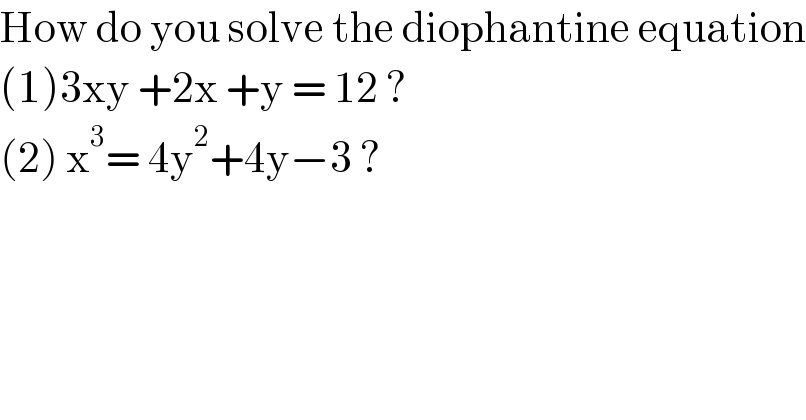
Question Number 136792 by EDWIN88 last updated on 26/Mar/21

$$\mathrm{How}\:\mathrm{do}\:\mathrm{you}\:\mathrm{solve}\:\mathrm{the}\:\mathrm{diophantine}\:\mathrm{equation} \\ $$$$\left(\mathrm{1}\right)\mathrm{3xy}\:+\mathrm{2x}\:+\mathrm{y}\:=\:\mathrm{12}\:? \\ $$$$\left(\mathrm{2}\right)\:\mathrm{x}^{\mathrm{3}} =\:\mathrm{4y}^{\mathrm{2}} +\mathrm{4y}−\mathrm{3}\:? \\ $$
Answered by mindispower last updated on 26/Mar/21
![(1),x=((12−y)/(3y+2)) ⇒3y+2∣12−y ⇒3y+2∣36−3y⇒3y+2∣38 ⇒3y+2∈{−38,−19,−2,−1,1,2,19,38} 3y+2=−19⇒y=−7,3y+2=−1,y=−1, y=0,y=12 tcchek one one because we used ⇒ not ⇎ (2) ⇔X^3 =4y(y+1)+5−8 ∵2∣y(y+1)⇒ X^3 =5(8) x≡(0.....7)[8] x^3 ≡{0,1,0,3,0,3,0,1}[8[ cant bee ≡5[8] no solution in Z for (2)](Q136796.png)
$$\left(\mathrm{1}\right),{x}=\frac{\mathrm{12}−{y}}{\mathrm{3}{y}+\mathrm{2}} \\ $$$$\Rightarrow\mathrm{3}{y}+\mathrm{2}\mid\mathrm{12}−{y} \\ $$$$\Rightarrow\mathrm{3}{y}+\mathrm{2}\mid\mathrm{36}−\mathrm{3}{y}\Rightarrow\mathrm{3}{y}+\mathrm{2}\mid\mathrm{38} \\ $$$$\Rightarrow\mathrm{3}{y}+\mathrm{2}\in\left\{−\mathrm{38},−\mathrm{19},−\mathrm{2},−\mathrm{1},\mathrm{1},\mathrm{2},\mathrm{19},\mathrm{38}\right\} \\ $$$$\mathrm{3}{y}+\mathrm{2}=−\mathrm{19}\Rightarrow{y}=−\mathrm{7},\mathrm{3}{y}+\mathrm{2}=−\mathrm{1},{y}=−\mathrm{1}, \\ $$$${y}=\mathrm{0},{y}=\mathrm{12} \\ $$$${tcchek}\:{one}\:{one}\:{because}\:{we}\:{used}\:\Rightarrow\:{not}\:\nLeftrightarrow \\ $$$$\left(\mathrm{2}\right)\:\Leftrightarrow{X}^{\mathrm{3}} =\mathrm{4}{y}\left({y}+\mathrm{1}\right)+\mathrm{5}−\mathrm{8}\:\because\mathrm{2}\mid{y}\left({y}+\mathrm{1}\right)\Rightarrow \\ $$$${X}^{\mathrm{3}} =\mathrm{5}\left(\mathrm{8}\right) \\ $$$${x}\equiv\left(\mathrm{0}.....\mathrm{7}\right)\left[\mathrm{8}\right] \\ $$$${x}^{\mathrm{3}} \equiv\left\{\mathrm{0},\mathrm{1},\mathrm{0},\mathrm{3},\mathrm{0},\mathrm{3},\mathrm{0},\mathrm{1}\right\}\left[\mathrm{8}\left[\right.\right. \\ $$$${cant}\:{bee}\:\equiv\mathrm{5}\left[\mathrm{8}\right]\:{no}\:{solution}\:{in}\:\mathbb{Z}\:{for}\:\left(\mathrm{2}\right) \\ $$
Commented by Rasheed.Sindhi last updated on 28/Mar/21

$$\mathcal{S}{ir}\:{mindispower} \\ $$$$\mathcal{H}{ow}\:{in}\:\mathrm{3}{rd}\:{line}\Rightarrow\mathrm{3}{y}+\mathrm{2}\mid\mathrm{36}−\mathrm{3}{y}\Rightarrow\mathrm{3}{y}+\mathrm{2}\mid\overset{?} {\mathrm{38}}\:? \\ $$
